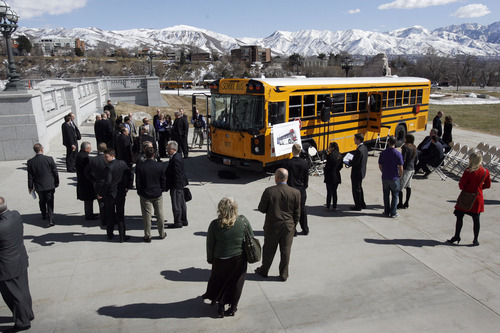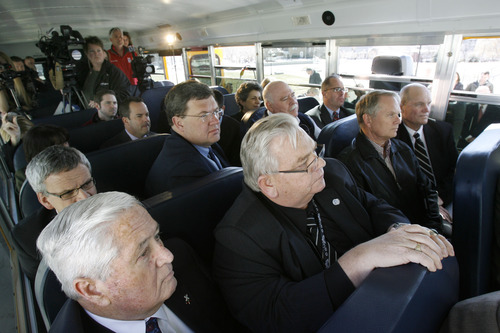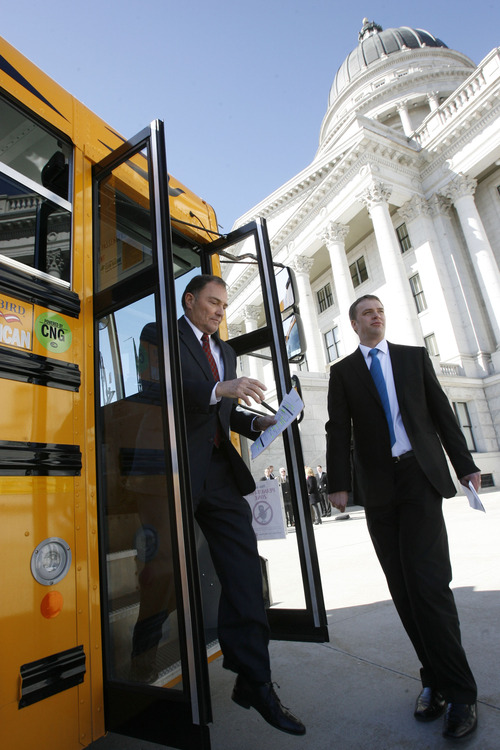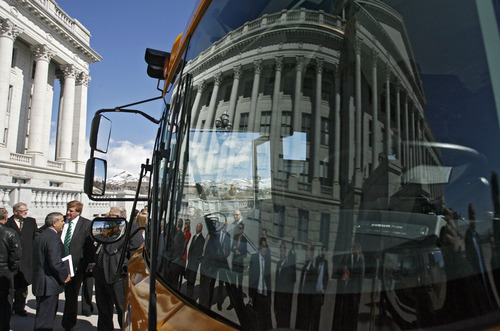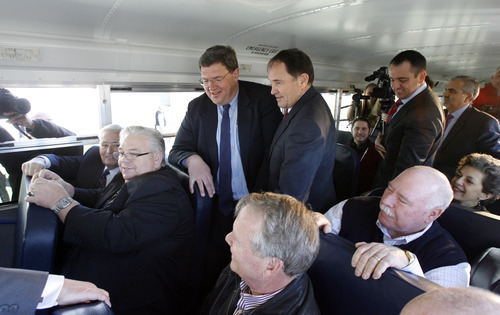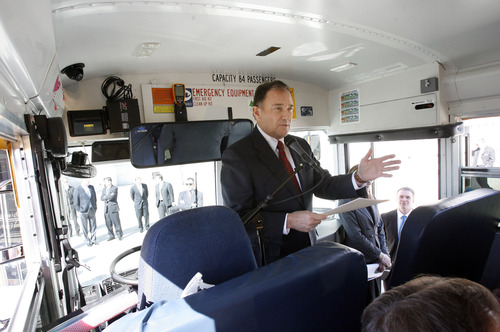This is an archived article that was published on sltrib.com in 2013, and information in the article may be outdated. It is provided only for personal research purposes and may not be reprinted.
After weeks of protests and criticism over pollution and inversions, Gov. Gary Herbert and legislative leaders jumped Monday on the natural gas bandwagon — literally — to promote its increased use as a motor fuel to help clean Utah's air.
They held a press conference inside a natural-gas-powered school bus — not near it, but in it — to unveil and explain several bills they say will help reduce pollution.
"It's clearly the fuel of the future," Herbert said in the driver's seat of both the bus and the push for the legislation. "It's a step in the right direction. It's not going to solve all our problems with air quality and inversion" but will start the state moving toward remedies.
The press conference unveiled SB275, which would encourage and allow interlocal agreements for local governments to join together to bond, or borrow, to buy new natural gas powered vehicles or convert their current fleets. It could also help finance more fueling stations and maintenance facilities.
Sen. Stuart Adams, R-Layton, sponsor of the bill, said it would permit Public Service Commission to allow Questar to use earnings to create a revolving loan fund for that effort.
Claire Geddes, cofounder of Utah Legislative Watch, said she worries that the costs of natural gas conversion could be added as a "hidden tax" onto natural gas ratepayers, and said it could hurt the poor — and worried about lawmakers rushing it through late in the session with little review.
But Adams said he would like to see every bus in the state, for example, converted to the cleaner burning fuel. "It costs about $30,000 to convert a bus to natural gas," he said, but added that can be paid off in two years from savings in fuel costs. And supporters said adding one natural gas bus on the road is equivalent to taking 15 to 20 gasoline or diesel powered vehicles off the road in reducing pollutants.
"This year we have had 23 days of inversions," Adams said. "About 58 percent of the pollutants come from tailpipes," so he said it makes sense to fight pollution by pushing a cleaner burning fuel that is plentiful in Utah, and would reduce dependence on foreign oil
As a start, Herbert said that of the 664 vehicles that the state plans to replace in its fleet this year, 100 will be hybrids or powered by natural gas. Mike Allegra, executive director of the Utah Transit Authority, said it is already in the process of buying 24 new natural gas buses this year — the first such vehicles it has owned in years.
Herbert also used the press conference to endorse HB96, which would extend tax credits of up to $2,500 to buy new natural gas vehicles, or convert old ones.
He also endorsed HB168 — sponsored by Democratic Rep. Patrice Arent — to require all state agencies, the Legislature, counties, school districts and others to within a year come up with plans on how to reduce pollution, and report back on their efforts. Herbert said he has already instructed his Cabinet to take steps to ensure more efficient use of transportation, including more telecommuting.
Utah Democratic Party Executive Director Matt Lyon criticized Herbert for not doing more.
"His only major efforts to address air quality are a $60,000 'Herbert for Clean Air' political ad campaign on the taxpayer dime [for ads urging wiser commuting] and a message bill in support for alternative fuels," he said.
Lyon added that Herbert and Republicans "are playing in the margins looking for cheap political points, rather than providing substantive leadership," and criticized him for not backing other bills promoted by Democrats.
That includes a proposal by Rep. Joel Briscoe, D-Salt Lake City, to spend $9 million to give free UTA bus and train rides for two months of the year to see how it may help clean the air, and one by Rep. Rebecca Chavez-Houck, D-Salt Lake City, to allow the state to adopt air quality rules more stringent than national standards.
Herbert said he is willing to consider all reasonable and rational ideas to reduce air pollution — "and even some that may be unreasonable and irrational" — to generate ideas, and said all are on the table.
Meanwhile, the House Revenue and Taxation Commission shot down a Democratic bill Monday seeking to improve air quality by encouraging more people to ride mass transit. It voted 4-7 against HB138 to give tax credits to individuals — not corporations — who buy transit passes.
Its sponsor, Rep. Marie Poulson, D-Cottonwood Heights, said the credit would have give people 25 percent of what they spend on passes above $450, up to a $100 credit. Legislative fiscal analysts estimated it would cost $800,000 a year in lost revenue, but perhaps bring a 5 percent increase in ridership
UTA supported the proposal as a step toward even greater increases in ridership. UTA General Counsel Bruce Jones noted that if people would take transit just one day a week, ridership would triple and air quality would improve significantly. He said free ridership on red air quality days would increase ridership an estimated 50 percent.


